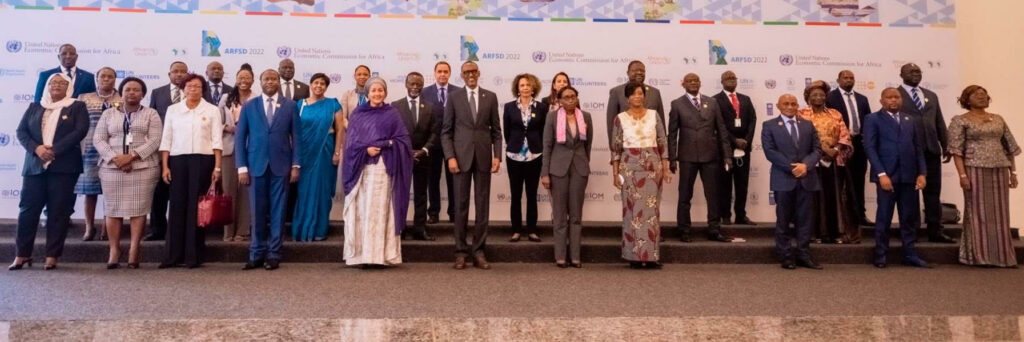The Kigali Declaration: How far would you go, Africa to realise the goals?
 Last Saturday March 5, 2022, the Eight Africa Regional Forum on Sustainable Development (ARFSD) ended in the Rwandan capital, Kigali. Present at the three-day meeting held, both in person and virtually were government and state officials, civil society, activists and journalists.
Last Saturday March 5, 2022, the Eight Africa Regional Forum on Sustainable Development (ARFSD) ended in the Rwandan capital, Kigali. Present at the three-day meeting held, both in person and virtually were government and state officials, civil society, activists and journalists.
Organised under the theme, “Building forward better: a green, inclusive and resilient Africa poised to achieve the 2030 Agenda and the Agenda 2063”, participants ponded over the current state of affairs in Africa, particularly the impact of the COVID-19 on the continent, especially, its impact on the continent’s economy.
The conversation went on to look at how Africa can pursue the paths necessary for attaining the lofty and well considered goals of 2030 Agenda and Agenda 2063, aimed at building the “Africa that we want” in which no one is left behind.
At the end of the Forum, all 54 member states in attendance adopted what is known as the ‘Kigali Declaration’ which urges African countries to link mutually reinforcing policies for sustainable development and COVID-19 recovery to ensure inclusive emergence from the pandemic.
The declaration calls on African countries to leverage new tools, innovative solutions, and technology, including through enhanced partnerships with the private sector, academia, non-governmental, civil-society, and other stakeholders to build strong, agile, sustainable, and resilient national statistical systems.
It also highlighted the need for countries to leverage the potential of the African Continental Free Trade Area Agreement (AfCFTA) to support the development of regional value chains, citing the case of minerals used in the production of batteries and electric vehicles as an example.
The Declaration noted the health and socioeconomic impact of the COVID-19 pandemic and how it rolled back efforts to achieve the Sustainable Development Goals, especially in developing countries, and the diverging paths to recovery from the pandemic between developed and developing countries and how that could mean longer periods of recovery for developing countries.
The declaration considered the disproportionate impact of climate change on the African continent given its low-carbon footprint, the role of the continent in capturing greenhouse gases, and its needs to mitigate and adapt to the adverse effects of climate change.
It also recalled and reaffirmed the Brazzaville Declaration, adopted at the seventh session of the Africa Regional Forum on sustainable Development; noting the need for scaled up and sustainable finance for an inclusive recovery from the COVID-19 crisis and accelerated delivery of sustainable development in Africa.
The declaration welcomed among others, the establishment of the Liquidity and Sustainability Facility as mechanism for improving market access for African countries and, in particular, for crowding in private-sector investment in the green recovery of the continent, the launch of the Alliance of Entrepreneurial Universities in Africa and the African Technology Development and Transfer Network, which have been established to facilitate the sharing of experiences and best practices among academic and research institutions across the continent, and expressed support for the ongoing process, under the Convention on Biological Diversity, of developing a post-2020 global biodiversity framework as a global policy framework for achieving accelerated action and transformative pathways for biodiversity and sustainable development, among others.
In his keynote address, President Paul Kagame of Rwanda said: “Over the years, Africa has made significant progress to tackle socio-economic challenges. However, the COVID-19 pandemic has slowed development gains, and in some cases reversed that progress that had been made. But we have to look for that silver lining in this crisis. Through our response, we can build an Africa that is greener and more resilient, with the Sustainable Development Goals and Agenda 2063 as our blueprint.
The truth is that we were off-track in achieving these targets, even before the pandemic in some cases. Instead of being a setback, pandemic response and recovery can be used as a springboard to speed up progress, and innovate smarter ways to invest in human capital development.”
He added: “Building the Africa we want, is up to us. We have to own and lead the process, and support one another. That is why these two development agendas are so important. It is about ensuring the stability and prosperity of our continent, so that our young people can have the future they deserve.”
Having taken part in formulating and signing the declaration, how far is Africa prepared to go, to realise the objectives set in the Kigali Declaration, as Africans cannot wait any longer for the goals outlined in the declaration to be achieved, especially, Africa’s restless and teeming youth.
Download the full declaration here.
By Emmanuel K. Dogbevi, back from Kigali, Rwanda
Copyright ©2022 by NewsBridge Africa
All rights reserved. This article or any portion thereof may not be reproduced or used in any manner whatsoever without the express written permission of the publisher except for the use of brief quotations in reviews.
